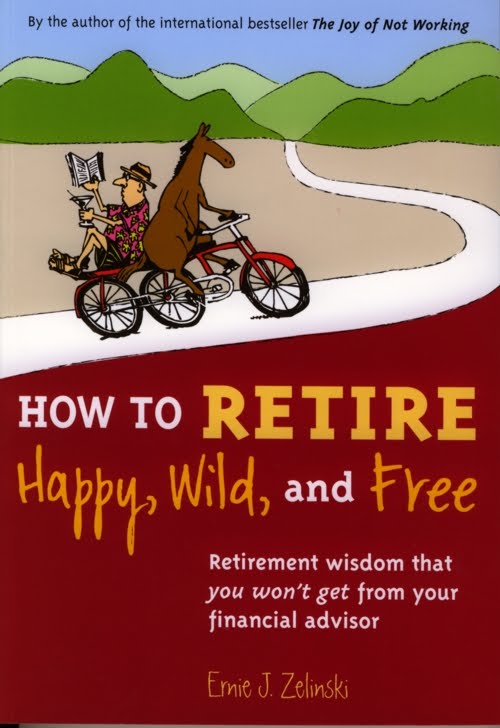
Financial planner Robert Doyle (CPA with Spoor, Doyle & Associates in St. Petersburg, FL) once said, "When you retire, your house is your home. Don’t look at it as an investment. You can convert it if you need to, but if you’re retiring because of the equity in your house, you better get back to work."
A little over a year and a half ago, when I was forced to purchase the half-duplex that I had rented happily for over 25 years, some of my friends warned me that I could be purchasing at the height of the house boom in Edmonton. I told my friends that I was aware of this but I was not purchasing the place as an investment or as part of my retirement plan. Indeed, houses should never be considered as an investment — for retirement or otherwise!
"A house should be viewed only as any other consumer item," was how I put it. "Then if the price goes down, it is no different than when the price of your car or your running shoes go down in price. Unfortunately, most people don't understand this. Some do, however. (Robert T. Kiyosaki, the author of Rich Dad, Poor Dad , stated that your house is not an asset but a liability.)
"The problem," I told my friends, "is that millions of people have been conned by shady bankers and real estate agents into believing that their home is the biggest investment that they will ever make in their lives. What a ridiculous statement! I know that the biggest investment that I will ever make in my life is in myself, in my self-education about how to live within my means so that I don't have money problems. My self-education also is enhanced by tapes, books, and seminars on how to create money in innovative ways so that I don't have to live in poverty — even if haven't had a real job in over 25 years."
"The problem," I told my friends, "is that millions of people have been conned by shady bankers and real estate agents into believing that their home is the biggest investment that they will ever make in their lives. What a ridiculous statement! I know that the biggest investment that I will ever make in my life is in myself, in my self-education about how to live within my means so that I don't have money problems. My self-education also is enhanced by tapes, books, and seminars on how to create money in innovative ways so that I don't have to live in poverty — even if haven't had a real job in over 25 years."
Alas, the con job of having people believe that their houses are investments has come home to roost. The 2008 Retirement Confidence Survey just showed the biggest one-year drop in its 18-year history.
One of the major reasons was that that home ownership was a substantial component of most respondents' net financial worth: one-third on average, according to a study of baby boomer retirement security by Dartmouth College economist Annamaria Lusardi and her colleagues.
They further calculated that an average national housing price drop of 13.5 percent — less than we've already experienced — would decrease the net worth of the boomers they surveyed an average of 10 percent.
A loss of 10 percent of net worth for people on the verge of retirement — which doesn't include stock market losses or the losses people will incur if the housing market continues to fall, as many analysts think it will — can have a big impact on a retiree's ability to live the life he or she imagined.
Yet many Americans are relying on their homes as a source of income in retirement, either through downsizing to a smaller property or through dubious transactions like reverse mortgages. Between 1997 and 2006, housing prices increased an average of 83 percent, leading more people to assume their equity would see them through their retirement years.
In the last year, however, house prices in the U.S. are down on average 14.1 percent. Worse yet, some people say that the house price declines have just started. A few analysts are predicting that house prices will go down for 5 to 7 years straight. Think this can't happen? You are fooling yourself. Remember how financial analysts claimed that real estate prices could never go down in Japan, particularly Tokyo. When Japan had their recession hit in the 1990s, real estate prices in Tokyo declined for 10 years straight.
So much for houses as investments for retirement. Again, houses are consumer products and not investments. If you are buying a house on the hope that it will go up, you are speculating. If you are speculating, you should be prepared for the price to go down instead of up. Don't blame anyone else when your house price goes down. You caused this situation to happen by believing what the shady real estate agents and mortgage lenders have told you.
If you want to be financially well-prepared for retirement, invest in yourself by spending as much money as you can on books, seminars, and motivational tapes on how to run your own business or how to make money on the Internet. Fact is, the most valuable asset is actually your ability to earn an income.
I know that if I was to lose all my financial net worth that I have today, I can still survive financially. I can earn a living without having to get a job and still have a great retirement. The same applies to you. Your marketable job skills and knowledge represent your personal earning power. Although the banks and other financial institutions don't count intangibles such as creativity, innovative character, risk-taking ability, and specialized knowledge in tallying your net worth, you should. These items are much more important to a retirement portfolio than a house.
WHAT YOU DON'T KNOW ABOUT WHAT MAKES PEOPLE HAPPY IN RETIREMENT CAN GREATLY HURT YOU!
Retirement is a double-edged sword. You either make it work for you - or it will cut your happiness in half. The more you know about the secrets to a successful retirement, the
happier you will be once you retire.
That's why you need The World's Best Retirement Book by Ernie Zelinski .
Purchase How to Retire Happy, Wild, and Free on Amazon.com with this direct link:

- Retirement Gift Ideas at The Retirement Gifts Café
- 1001 Ways to How to Retire Happy
- Retirement Quotations at The Joy of Not Working
- Free E-Books
The Best Retirement Book in the World

Over 100,000 Copies Sold
Published in 7 Foreign Languages
Purchase How to Retire Happy, Wild, and Free on Amazon.com with this direct link:





Why not check out These Retirement Resources?
ReplyDeletehttp://www.retirement-cafe.com/Retirement-Letters.html
http://www.retirement-cafe.com/Retirement-Gifts.html
The Joy of Being Retired:
http://www.thejoyofbeingretired.com/Retirement-Letters-to-Announce-Your-Liberation.html
http://www.thejoyofbeingretired.com/Retirment-Planning-for-Retirees-Who-Are-Bad-Spellers.html
A holistic approach to the fears, hopes, and dreams that people have about retirement will prove to be much more important for creating
ReplyDeletean active, satisfying, and happy retirement than how much money you have saved.
See These Other Important Retirement Resources:
Best Places to Retire Happy
Retirment Planning
Retirement Letters
SPONSORSHIP IS ALL ABOUT PROFITS - THAT IS THE WAY IT SHOULD BE
All by: Zelinski, Ernie